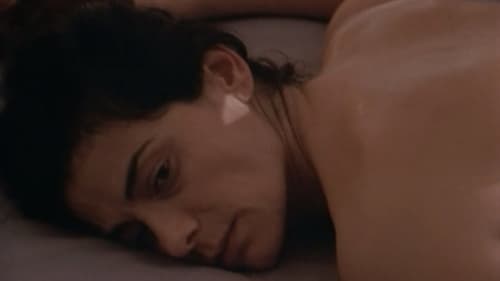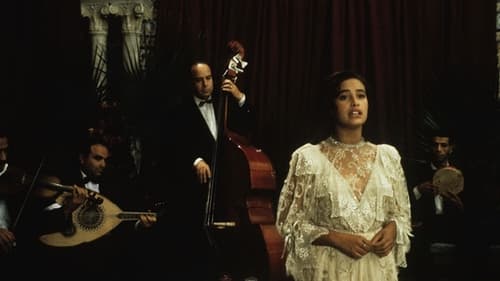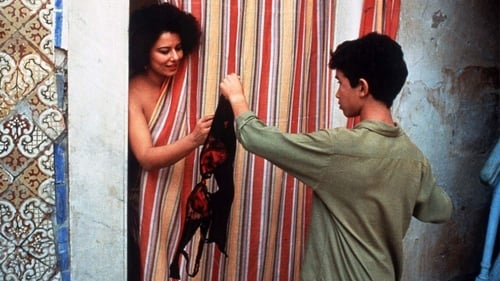Moufida Tlatli
출생 : 1947-08-04, Sidi Bou Saïd, Tunisia
사망 : 2021-02-07
약력
Moufida Tlatli was a Tunisian film director, screenwriter and editor. She is noted for her breakthrough film The Silences of the Palace in 1994, which won several international awards. She went on to direct two more films: The Season of Men and Nadia and Sarra.

Writer
튀니지 출신의 중년 여성 나디아는 걱정거리 없는 삶을 살지만, 갱년기에 접어들면서 불안해진다. 나디아는 18세인 딸 사라와도 갈등을 겪기 시작한다.

Director
튀니지 출신의 중년 여성 나디아는 걱정거리 없는 삶을 살지만, 갱년기에 접어들면서 불안해진다. 나디아는 18세인 딸 사라와도 갈등을 겪기 시작한다.

Writer
아이차는 18살의 신부로 남편 사이드가 일 년 중 11달을 튀니스에서 일할 동안 고향에서 그를 기다려야 한다. 당찬 아이차는 자신도 함께 튀니스로 가고 싶다고 말하고, 그곳에 갈 돈은 자신이 카페트를 짜서 장만하겠다고 한다. 그러자 사이드는 먼저 아들을 낳아야 한다는 조건을 제시한다. 아이치는 동네 여성들과 서로의 꿈을 이야기하고, 남자들이 돌아올 때마다 마을은 축제 분위기로 들뜬다. 남자들이 돌아올 때면 여자들은 머리를 염색하고 목욕을 하며 웃음을 되찾는다. 그러나 세월이 흐르면서, 아이차를 비롯한 다른 여성들은 꿈에서 깨어나기 시작한다. 아이차가 두 딸 뒤에 얻은 아들 아지즈는 그녀의 꿈을 현실로 만들어 줄 듯하지만, 오랫동안 기다렸던 아들은 어머니에게 아픔만 남길 뿐이다. 세월이 흘러 아지즈와 두 딸, 그리고 친구 자이네브와 함께 고향에 돌아온 아이차는 과거를 이해하게 되고 신뢰와 평화, 그리고 평온을 되찾는다.

Director
아이차는 18살의 신부로 남편 사이드가 일 년 중 11달을 튀니스에서 일할 동안 고향에서 그를 기다려야 한다. 당찬 아이차는 자신도 함께 튀니스로 가고 싶다고 말하고, 그곳에 갈 돈은 자신이 카페트를 짜서 장만하겠다고 한다. 그러자 사이드는 먼저 아들을 낳아야 한다는 조건을 제시한다. 아이치는 동네 여성들과 서로의 꿈을 이야기하고, 남자들이 돌아올 때마다 마을은 축제 분위기로 들뜬다. 남자들이 돌아올 때면 여자들은 머리를 염색하고 목욕을 하며 웃음을 되찾는다. 그러나 세월이 흐르면서, 아이차를 비롯한 다른 여성들은 꿈에서 깨어나기 시작한다. 아이차가 두 딸 뒤에 얻은 아들 아지즈는 그녀의 꿈을 현실로 만들어 줄 듯하지만, 오랫동안 기다렸던 아들은 어머니에게 아픔만 남길 뿐이다. 세월이 흘러 아지즈와 두 딸, 그리고 친구 자이네브와 함께 고향에 돌아온 아이차는 과거를 이해하게 되고 신뢰와 평화, 그리고 평온을 되찾는다.

Self
The film consists largely of a series of interviews with female filmmakers from several different countries and filmmaking eras. Some, such as Agnès Varda and Catherine Breillat (both from France), have been making films for decades in a conscious effort to provide an alternative to the male filmmaking model; others, such as Moufida Tlatli (Tunisia) and Carine Adler (England), are relative newcomers to directing, and their approaches seem more personal and less political. The film as a whole manages to cover some important topics in the feminist debate about film -- how does one construct a female gaze, how can one film nude bodies without objectifying the actors (of either sex), what constitutes a strong female role -- while also making it clear that “women’s film” comprises as many different approaches to filmmaking as there are female filmmakers.

Editor
왕자를 시중들던 하녀의 딸 알리아는 왕자의 부고를 받고 10년 전 떠났던 궁전을 찾아간다. 그곳에서 알리아는 계급은 물론 성적으로도 종속되어 있던 엄마의 어두운 삶과 그로 인해 혼란스러웠던 자신의 어린 시절을 회상한다. 튀니지아가 프랑스 식민치하에서 벗어난 후 한 소녀의 성적 정체성의 혼란을 그린, 튀니지아 출신의 여성감독 무피아 틀라틀리의 첫 데뷔작. 아랍 여성 영화사에 한 획을 그은 작품으로 억압 받는 여성의 해방과 권리 찾기를 보여준다. 궁전의 제일 밑바닥 공간인 부엌은 여성들의 삶의 공간이자 자유의 공간이다. 감독은 1950년 독립 이전 프랑스의 속국이었던 튀니지의 이국적인 정취와 무슬림 전통을 매력적으로 담아내면서 페미니즘적 관점으로 여성의 위치와 남성 특권에 대해 조망한다. 1994 토론토 영화제 비평가상 수상. 1994 칸느 영화제 특별 언급.

Writer
왕자를 시중들던 하녀의 딸 알리아는 왕자의 부고를 받고 10년 전 떠났던 궁전을 찾아간다. 그곳에서 알리아는 계급은 물론 성적으로도 종속되어 있던 엄마의 어두운 삶과 그로 인해 혼란스러웠던 자신의 어린 시절을 회상한다. 튀니지아가 프랑스 식민치하에서 벗어난 후 한 소녀의 성적 정체성의 혼란을 그린, 튀니지아 출신의 여성감독 무피아 틀라틀리의 첫 데뷔작. 아랍 여성 영화사에 한 획을 그은 작품으로 억압 받는 여성의 해방과 권리 찾기를 보여준다. 궁전의 제일 밑바닥 공간인 부엌은 여성들의 삶의 공간이자 자유의 공간이다. 감독은 1950년 독립 이전 프랑스의 속국이었던 튀니지의 이국적인 정취와 무슬림 전통을 매력적으로 담아내면서 페미니즘적 관점으로 여성의 위치와 남성 특권에 대해 조망한다. 1994 토론토 영화제 비평가상 수상. 1994 칸느 영화제 특별 언급.

Director
왕자를 시중들던 하녀의 딸 알리아는 왕자의 부고를 받고 10년 전 떠났던 궁전을 찾아간다. 그곳에서 알리아는 계급은 물론 성적으로도 종속되어 있던 엄마의 어두운 삶과 그로 인해 혼란스러웠던 자신의 어린 시절을 회상한다. 튀니지아가 프랑스 식민치하에서 벗어난 후 한 소녀의 성적 정체성의 혼란을 그린, 튀니지아 출신의 여성감독 무피아 틀라틀리의 첫 데뷔작. 아랍 여성 영화사에 한 획을 그은 작품으로 억압 받는 여성의 해방과 권리 찾기를 보여준다. 궁전의 제일 밑바닥 공간인 부엌은 여성들의 삶의 공간이자 자유의 공간이다. 감독은 1950년 독립 이전 프랑스의 속국이었던 튀니지의 이국적인 정취와 무슬림 전통을 매력적으로 담아내면서 페미니즘적 관점으로 여성의 위치와 남성 특권에 대해 조망한다. 1994 토론토 영화제 비평가상 수상. 1994 칸느 영화제 특별 언급.

Editor
Twelve-year-old Noura dangles uncertainly in that difficult netherworld between childhood and adulthood. His growing libido has gotten him banned from the women's baths, where his mother took him when he was younger, but he's not yet old enough to participate in grown-up discussions with the men of his Tunisian village. Noura's only real friend is a troublemaker named Salih -- the village political outcast.

Editor
Two Palestinian lovers, parted during the 60s when he is imprisoned for resisting the Israeli occupation and she sorrowfully emigrates to the US, come together again in Jerusalem some 18 years later. He works for an agricultural aid organization, she is a scholar researching the meaning of sacrifice in Palestinian society. Around them rages the turmoil of the first Intifada.

Editor

Editor
In this Sufi tale, Nadia, a young Moroccan emigre returns from Paris to Fez to visit her dying father. At his funeral, she is overcome by the voice of Karina chanting the Koran. A powerful friendship develops between the two women as they decide to turn the father's palace into a shelter for Muslim women.

Editor
A determined young woman in a remote Tunisian city bucks tradition by studying for an academic degree, instead of accepting the time-honored, submissive role of her sex as a wife and housekeeper for some 'mustached man'.

Editor
Focusing on key Arab films produced in the last 20 years. Férid Boughedir traces the development of the film-makers' concern to produce more socially aware cinema. Themes include the issue of Palestinian homeland rights and the nature of Arab identity. The film-makers also share a desire to develop a strong poetic tradition.

Editor
The first of Nacer Khemir's highly-regarded Desert Trilogy that includes The Dove's Lost Necklace and Bab'Aziz - The Prince Who Contemplated His Soul. Khemir creates an exotic world with Wanderers of the Desert when a young teacher arrives to take over a village school isolated in the shimmering desert. Legendary figures materialize out of wells and the desert itself, groups of children hurry through a labyrinth of underground corridors, the teacher is whisked away to a mysterious rendezvous and never returns.

Editor
Mahmoud Ben Mahmoud's first feature film.

Editor
Rich in environmental mood and ethnic color, this human drama chronicles the lives and rituals of a nomadic Berber tribe in the southern Tunisian desert, especially focusing on a son about to inherit the full mantle of leadership. When he sees that their sheep are threatened with a possibly devastating illness, the precarious nature of the group's existence is brought home to him and he leaves to gain a livelihood and knowledge in the city. Once he gets back, bringing money and presents, it first appears that the group will be assured of a better future because of his enterprising outreach. Yet military and governmental officials arrive on the scene to take a census and the young man is conscripted, against his will.

Editor
The first full length film to be shot within the disputed Palestinian West Bank "Green Line," FERTILE MEMORY is the feature debut of Michel Khleifi, acclaimed director of the Cannes Film Festival triumph, WEDDING IN GALILEE. Lyrically blending both documentary and narrative elements, Khleifi skillfully and lovingly crafts a portrait of two Palestinian women whose individual struggles both define and transcend the politics that have torn apart their homes and their lives.

Editor
Directed by Abdellatif Ben Ammar.

Editor
Farouk Beloufa's only directorial endeavor follows the life of a group of leftist friends in West Beirut in the early 1970s. Coupled with its exploration of war through photography and cinematography, Nahla is a love story starring the glamorous Yasmine Khlat and featuring a soundtrack composed by Ziad Rahbani.

Editor
A watershed film, Omar Gatlato held a mirror up to Algerian male culture and the mirror cracked. The title refers to the expression "gatlato al-rujula," or, roughly, "machismo killed him" and the film's mordant insights into male posturing and alienation in Algerian society animate this bit of folk wisdom. In mock documentary style, a young man recounts with wry commentary a typical day in his life in the Bab el-Oued quarter of Algiers, while the camera playfully shows a different story. In following Omar and his friends in their pursuit of happiness, the film examines with shrewd humor the gang values of urban youth; their passion for popular culture (soccer, "Hindoo" movies, Rai concerts), their hidden fear of women, and their social insecurity in an environment where they are marginalized.

Editor
A pioneering film from Tunisia, Fatma 75 is the first non-fiction film by a Tunisian woman, a feminist essay film, and the first in a series of powerful films about strong female figures in the country. The film was made in the UN International Women's Year 1975, and has long been recognised as one of the most important films from North Africa, but has never officially been seen before due to censorship.

Editor
Kemal studies in the Sadiki boarding school. Since the death of his father who was murdered by a secret colonial organization, Kemal has doubts about the political situation of Tunisia.









